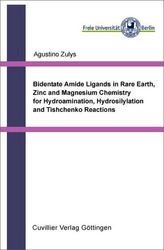| Fachbereiche | |
|---|---|
| Buchreihen (97) |
1381
|
| Nachhaltigkeit |
3
|
| Gesundheitswesen |
1
|
| Geisteswissenschaften |
2370
|
| Naturwissenschaften |
5407
|
| Mathematik | 228 |
| Informatik | 319 |
| Physik | 980 |
| Chemie | 1364 |
| Geowissenschaften | 131 |
| Humanmedizin | 243 |
| Zahn-, Mund- und Kieferheilkunde | 10 |
| Veterinärmedizin | 108 |
| Pharmazie | 147 |
| Biologie | 835 |
| Biochemie, Molekularbiologie, Gentechnologie | 121 |
| Biophysik | 25 |
| Ernährungs- und Haushaltswissenschaften | 45 |
| Land- und Agrarwissenschaften | 1005 |
| Forstwissenschaften | 201 |
| Gartenbauwissenschaft | 20 |
| Umweltforschung, Ökologie und Landespflege | 148 |
| Ingenieurwissenschaften |
1798
|
| Allgemein |
98
|
|
Leitlinien Unfallchirurgie
5. Auflage bestellen |
|
Erweiterte Suche
Bidentate Amide Ligands in Rare Earth, Zinc and Magnesium Chemistry for Hydroamination, Hydrosilylation and Tishchenko Reactions
Augustino Zulys (Autor)Vorschau
Inhaltsverzeichnis, Datei (68 KB)
Leseprobe, Datei (140 KB)
Various active non-cyclopentadienyl metal catalysts for organic transformation such as inter-, intramolecular hydroamination, hydosilylation and Tishchenko reaction are presented. This thesis describe the catalysis of bis(phosphinimino)methanide (BIPM) rare earth metal amide, cyclooctatetraenide (COT) and Iodide complexes as well as aminotroponiminate zinc amide, alkyl complexes as well as 1,2-bis[(2,6-diisopropylphenyl)imino]acenaphthene (dpp-bian) magnesium complexes, and bis (alkylphenyl)formamido lanthanum complexes. The compounds used for these organic transformations were shown below.
Hydroamination of alkynes and unactivated alkenes using Zn complexes was done for the first time in homogeneous catalysis. More sterically demanding spectator ligands enhanced the reaction rate of Zn complexes as follows (BIPM)ZnMe > (BDI)ZnMe > (ipr2ATI)ZnMe, as well as more labile leaving group ligands increased the reactivity of the catalyst where Alkyl > Amido. The enantiopure S,S-Zn2(ipr-ATIPh)2(Me2) X and S,S-Zn2(ipr-ATIPh)2(Et2) XI were investigated for enantioselective hydroamination of aminoalkenes. Unfortunately both complexes could not compete with other catalysts because of their lower activity and catalyzed only at elevated temperature.
Bis(phosphin¬imino)methanide (BIPM) rare earth metal complexes were applied in the catalytic hydroamination of aminoalkyne and -alkenes. Altering the leaving group ligands of the complexes from stabile to labile ligand (cyclooctatetraenide and bisdimethylsilylamide) showed considerable change in activity of catalysts. Lanthanide complexes bearing more labile ligand (BDSA) XV exhibit good catalytic activities either for hydroamination, hydrosilylation and sequential hydroamination/hydrosilylation. BIPM halide lanthanide complexes showed good activity at elevated temperature (120 °C), whereas BIPM cyclooctatetraenide lanthanide complexes, which have no leaving group showed only low activity at high temperature 120 °C. The activities of these catalyst systems increased with increasing ionic radius of the metal center. The kinetic studies of BIPM lanthanide system indicates a zero order rate dependence on substrate concentration and first order rate dependence on catalyst concentration.
Magnesium complex [Mg(dpp-bian)(thf)3] XVI could also be used as catalyst for the hydroamination reaction of aminoalkenes and showed good activity at room temperature. Beside the intramolecular hydroamination this magnesium complex can be applied for intermolecular hydroamination of terminal alkynes with substituted aniline. The reaction proceeds under mild conditions in absence of co-catalyst or acidic promoter.
Finally, the improvement of the Tishchenko reaction using bis (alkylphenyl)formamidinates Lanthanum complexes XVII was done for various aldehyde substrates from aliphatic to aromatic, enolizable and non enolizable aldehyde. This complex showed high catalytic activity, even with electron rich aldehydes such as furfural, thiophenaldehyde –which are reported as difficult substrates– can be catalyzed to the corresponding ester at room temperature and 60 °C, respectively. The sterically more demanding ligand system influences the catalytic activity of the complexes. Complex XVIIa, which has less sterically hindered ligand, exhibited best catalyst for dimerization of aldehyde.
| ISBN-13 (Printausgabe) | 3867272964 |
| ISBN-13 (Printausgabe) | 9783867272964 |
| ISBN-13 (E-Book) | 9783736922969 |
| Buchendformat | A5 |
| Sprache | Englisch |
| Seitenanzahl | 120 |
| Auflage | 1 |
| Band | 0 |
| Erscheinungsort | Göttingen |
| Promotionsort | Berlin |
| Erscheinungsdatum | 17.07.2007 |
| Allgemeine Einordnung | Dissertation |
| Fachbereiche |
Chemie
|








